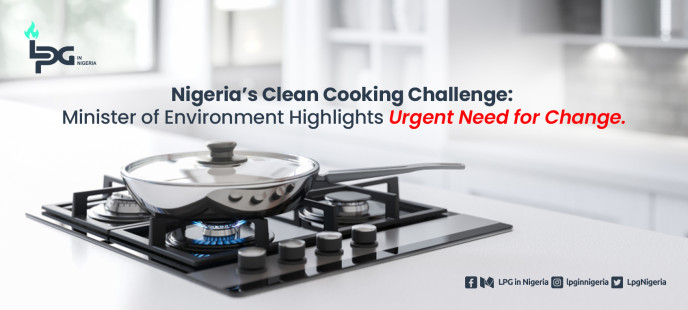- 3203
- 0
Sharing Ideas and Updates on LPG in Nigeria and related information to enable effective collaboration within the LPG Value Chain
Nigeria’s Clean Cooking Challenge: Minister Of Environment Highlights Urgent Need For Change

The Minister of Environment, Balarabe Lawal, recently brought attention to a pressing energy issue facing Nigeria: only one in ten households currently use clean energy sources and technologies for cooking. This alarming statistic underscores the significant challenges the nation faces in transitioning to sustainable and health-conscious cooking practices.
In a press release from Abuja, signed by the Head of the Press and Public Relations Unit, Ibrahim Haruna, Minister Lawal emphasized the detrimental impact of traditional cooking methods. Firewood, kerosene, and charcoal remain the primary fuels for many Nigerian households, contributing to deforestation, climate change, and severe health risks. These outdated methods also place heavy burdens on women, who are typically responsible for cooking in Nigerian households.
To address these challenges, the Federal Executive Council approved the National Clean Cooking Policy in March 2024. This policy is a key component of Nigeria’s broader Energy Transition Plan, which aims to achieve net-zero emissions by 2060. The policy is designed to promote clean cooking solutions that not only save lives but also empower women and youth, improve livelihoods, and contribute to the fight against climate change.
Minister Lawal also highlighted the economic potential of the National Clean Cooking Policy. The initiative is expected to create around 10 million direct jobs for young Nigerians in areas such as the assembly of local raw materials, production, and distribution of clean cookstoves. Additionally, the policy is anticipated to boost Nigeria’s national carbon credit market.
The National Clean Cooking Policy sets ambitious targets for 2030: 20% of the clean cooking target is expected to come from electric cooking sources, 54% from Liquefied Petroleum Gas (LPG), with a gradual phase-out of fuel-efficient biomass cookstoves. To support these goals, the Ministry of Environment is collaborating with local clean cookstove manufacturers to scale up production and provide training for youth in essential skills. Partnerships with international development organizations, including the World Bank, are also being pursued to ensure the successful implementation of the policy.
Initially introduced at the National Council on Environment in April 2024, the policy was formally launched during the National Clean Cooking Fair in Abuja in July 2024. The next phase involves rolling out the policy across all 36 states and the Federal Capital Territory, with the aim of ensuring widespread adoption and domestication.
This policy aligns with President Bola Tinubu’s “Renewed Hope Agenda,” offering a clear path toward a cleaner, healthier, and more sustainable future for Nigeria.
















0 Comment.